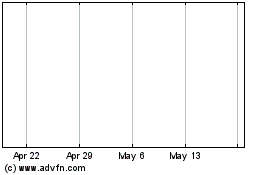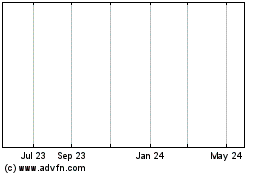Andorran Bank Fights U.S. Treasury Allegations
October 07 2015 - 4:20PM
Dow Jones News
Foreign banks are fighting back against the U.S. Treasury
department's power to cripple lenders suspected of laundering
money.
On Wednesday, owners of Banca Privada d'Andorra Group became the
second group of bank shareholders in recent months to file a
lawsuit asking the U.S. Treasury's Financial Crimes Enforcement
Network to explain why it accused their lender of laundering
money.
Earlier this year, the small Andorran bank was seized by its
regulators, following FinCEN's allegations and was frozen out of
the U.S. dollar market. On Wednesday, the Cierco family, which have
a controlling stake in BPA, said FinCEN "had no legitimate basis"
to accuse it of money laundering. The Ciercos are a prominent
business family in Andorra.
The family alleges in the lawsuit filed in Washington, D.C.,
that BPA was punished because FinCEN was frustrated that Andorran
authorities weren't implementing wider changes to their
anti-money-laundering rules. The Ciercos demanded FinCEN rescind
its notices against the bank.
A FinCEN spokesman declined to comment.
The 2001 Patriot Act gave the Treasury Department a unique power
to slap foreign financial institutions and countries it thinks are
laundering money with a "primary money laundering concern"
designation, which often effectively freezes them out of the U.S.
financial system. While the measure has been used less than 20
times since then, it has had devastating effects on the
institutions involved.
The BPA suit comes just over a month after a small
Tanzanian-based lender, FBME Bank Ltd, was granted a rare
injunction to block a FinCEN final rule which would have officially
locked it out of the U.S. financial system. A federal judge ruled
FBME should have more access to the evidence FinCEN used to
recommend the bank be shut out of the U.S. financial system. FinCEN
offered to refile its final notice to address procedural issues
raised by the judge, a move FBME's lawyers are challenging.
Over the past 12 years, the Treasury has used the statute, known
as 311, to hit banks with little connection to the U.S.
The so-called 311 statute was written in an ambiguous way that
left its use "wide open," according to a memoir by former top
Treasury official Juan Zarate, allowing U.S. regulators to clamp
down on a foreign bank without having to prove the institution was
criminally culpable. Under the law, the Treasury must consult with
other U.S. regulators when making the decision.
FinCEN tends to target small banks in far-flung countries, says
Stephen Heifetz a partner at Steptoe & Johnson LLP. U.S.
government officials "don't issue the death knell for systemically
important institutions in allied countries," he said.
The Treasury designation is supposed to go through a
bureaucratic rule-making process, where the targeted bank and
others could state their case against a preliminary blacklisting
decision. But in practice the maximum damage is done to a bank soon
after a preliminary decision is filed, according to lawyers and
experts.
The Treasury has only issued a final rule in three of 10 cases
against financial institutions in the past decade. The process of
pushing through a ruling can take years. Last month, FinCEN said
Lebanese Canadian Bank SAL was no longer a money laundering concern
because the bank no longer existed. The allegation was made in 2011
and a final notice was never issued. Challenging the ruling in
court is complicated, as much of the evidence FinCEN uses is
classified, according to court documents.
In March last year, FinCEN accused Banca Privada d'Andorra Group
of laundering funds for criminal groups. The bank's shareholding
family said in an interview with The Wall Street Journal at the
time that the U.S. authorities hadn't previously warned them of any
problems at the bank. They only learned of FinCen's intentions one
hour before the notice was published.
The impact was immediate, as banks including HSBC Holdings PLC
quickly froze BPA's correspondent bank accounts, according to the
lawsuit and a previous report by the Journal. Foreign banks use
correspondent accounts with U.S. banks to process transactions and
clear dollar payments.
BPA's Spanish business subsequently filed for bankruptcy and its
Andorran unit was seized by regulators, according to the Ciercos.
BPA's main shareholders contend that FinCEN refused to explain
their actions or why it imposed the harshest penalty possible
against the bank.
The Ciercos allege in the lawsuit filed on Wednesday that U.S.
authorities want to punish BPA as part of an effort to force
Andorran authorities to implement tighter money laundering
controls.
The principality of Andorra sits in the Pyrenees mountains
between France and Spain. The country has a small and thriving
banking industry that caters primarily to rich individuals.
Following the FinCEN notice, Anton Smith, attaché for economic
affairs at the U.S. embassy in Madrid said during a conference that
Andorran authorities were slow to react to U.S. concerns and that a
hammer needed to be brought down, according to a video of the
speech. A spokeswoman for the U.S. embassy in Spain didn't reply to
a request for comment.
Both BPA and FBME have said their internal controls against
money laundering were scrutinized by major consulting firms
including, KPMG LLP.
Write to Max Colchester at max.colchester@wsj.com and Rachel
Louise Ensign at rachel.ensign@wsj.com
Subscribe to WSJ: http://online.wsj.com?mod=djnwires
(END) Dow Jones Newswires
October 07, 2015 16:05 ET (20:05 GMT)
Copyright (c) 2015 Dow Jones & Company, Inc.
Treasury Group Ltd (ASX:TRG)
Historical Stock Chart
From Oct 2024 to Nov 2024

Treasury Group Ltd (ASX:TRG)
Historical Stock Chart
From Nov 2023 to Nov 2024
